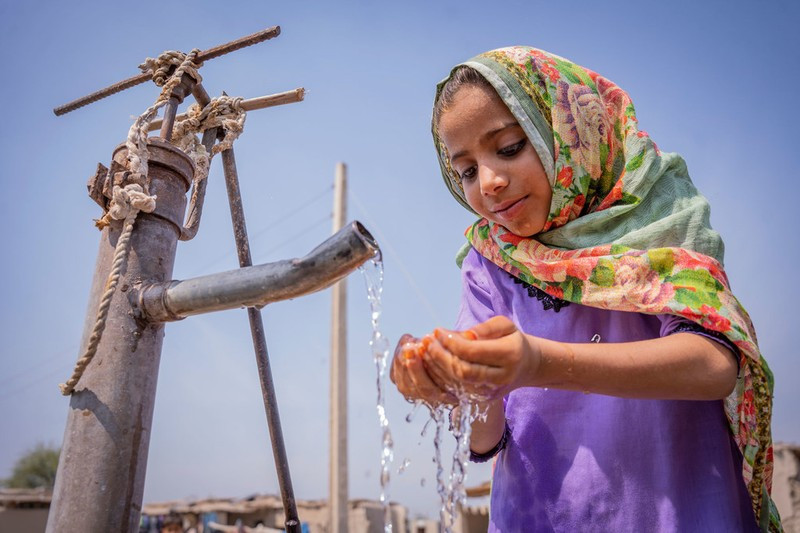The UN 2023 Water Conference took place from March 22 – 24, with five main dialogues, including Water for Health, Water for Sustainable Development, Water for Climate, Resilience and Environment, Water for Cooperation, and Water Action Decade. The discussions aimed to raise awareness about the importance of water, contributing to the achievement of sustainable development goals by 2030.
With about 6,500 guests, including hundreds of ministers and dozens of state leaders, governments and public and private enterprises, proposed water resource conservation programmes to reverse the trend of water scarcity and help the world meet the development goals set out in 2015, which ensured “access to water and water purification for all by 2030”.
The alarming situation
The world has experienced decades of water mismanagement and abuse, making water a pressing problem, that threatens many aspects of life and affects billions of people who depend on this important resource.
Global climate change is making water even more profoundly affect the world’s society, economy and environment. A worrying fact is that more than 80% of wastewater discharged into the environment is not treated or reused. Nearly three-quarters of disasters in recent years are related to water, causing economic losses of nearly 700 billion USD, over the past 20 years.
The COVID-19 pandemic has further exposed the world’s common vulnerabilities in the exploitation, management and use of water resources. The United Nations report warns that the world’s water resources are under serious threat, due to indiscriminate water consumption and overdevelopment.
United Nations Secretary-General Antonio Guterres said, that the world is going in the wrong direction due to the unsustainable use of water, pollution and global warming, causing water resources to become depleted. Meanwhile, Richard Connor, the editor-in-chief of the UN World Water Development Report said, that the impact of the world water crisis will be a “matter of scenarios”.
According to Connor, if no effort is promoted, about 40-50% of the world’s population will not have access to basic sanitation and about 20-25% of the world’s population will not have access to safe drinking water. He emphasised that the increasing world population, means more people do not have access to clean water. Water scarcity is exacerbated by pollution and abuse, while global warming increases seasonal water shortages, in both regions where it is currently abundant, as well as regions that are already in short supply.
The current water crisis is a threat to all countries. About 10% of the world’s population is living in water-threatened countries. At least 2 billion people globally use contaminated drinking water, which increases their risk of cholera, dysentery, typhoid and polio, while around 3.6 billion people do not have access to an effective water filtration system.
This figure does not even take into account the risk of water pollution from pharmaceuticals, chemicals, pesticides, microplastics and nanomaterials. The poor are the most severely affected when water insecurity is undermining food security, health security, energy security, urban development and social problems.
About 600 million children globally do not have access to safe drinking water, and more than 1.1 billion people do not have access to adequate sanitation. The United Nations Children’s Fund (UNICEF) recently released a report showing that about 190 million children in Africa face three risks related to water, including inadequate water, sanitation and hygiene (WASH). According to the Chief of the Water, Sanitation and Hygiene Programme of UNICEF, Africa is facing a water disaster.
Climate and water-related shocks are escalating globally, but Africa is the region most at risk and most severe for children. The 10 African countries that face the three most serious threats related to WASH, include Benin, Burkina Faso, Cameroon, Chad, Côte d'Ivoire, Guinea, Mali, Niger, Nigeria and Somalia. On average, about 1,000 children under the age of 5, die every day from diseases related to WASH, of which 2 out of 5 children live in the 10 African countries mentioned above.
The urgent problem of water resource management
According to the United Nations, water plays a pivotal and extremely important role in life on the planet, including sustainable development, now and in the future, and access to clean and safe water is the most basic human right. The freshwater ecosystems, which provide economic resources and moderate global warming, are among the most threatened places in the world. If urgent action is not taken and if there is no effective water management cycle now, human health and the world environment will face a crisis. This leaves a sustainable and equitable future still out of reach.
The United Nations water report concluded that to ensure access to safe drinking water for all by 2030, the current investment would have to be tripled. However, some observers expressed concern about the size of these commitments and the ability of funding, to materialise commitments.
The United Nations 2023 Water Conference is an opportunity for countries to discuss, evaluate, and share experiences and results of implementing the Water Action Decade and Water for Sustainable Development, to seek out new initiatives and make commitments and global action plans.
This is also an event marking a major and fundamental change in humanity’s awareness of the role and importance of water resources, for present and future generations.
















